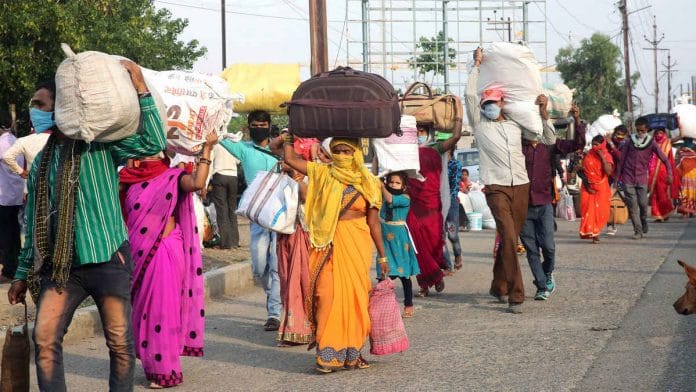New Delhi: Union Labour Minister Bhupender Yadav Thursday launched the much-awaited national database of unorganised workers, e-SHRAM. An online portal, e-SHRAM will have details of over 38 crore informal sector employees, including migrant workers, in a consolidated and comprehensive form.
While launching the portal, Yadav said this will be the first-ever national database of unorganised workers in India.
“Through the portal, the government will now start registering the over 38 crore unorganised sector workers, including construction workers, migrant workers, street vendors, domestic workers, among others. Registering on the portal will also entitle the unorganised worker to a one-year accidental coverage of Rs 2 lakhs,” Yadav said at the launch, calling it a “historic step”.
The database is expected to go a long way in ensuring that unorganised sector workers, especially migrant workers, do not suffer like they did last year following the nationwide lockdown when many lost their livelihood and had to return home, often on foot in the absence of public transport.
After the migrant workers’ crisis, the central government had announced a slew of welfare schemes including free rations and transfer of cash to the workers who were hit the hardest.
However, despite the initiative, many were deprived of the benefits as the government did not have enough details about their whereabouts.
One of the major roadblocks faced by the government in making sure welfare schemes reached the beneficiaries was the absence of a database of migrant workers.
Also read: After big losses, TN garment hub’s message to govt is clear: Migrants must stop migrating
How database will benefit workers
The database will be authenticated through an Aadhaar card. It will have details of workers such as their present status, skill type, family details, address, current location in case of migrant workers, and their movement from formal to the informal sector.
An unorganised sector worker will be able to self-register for free on the portal if he or she has access to a mobile phone. They can also visit the over four lakh Citizen Service Centres or post offices, where the staff will help them sign up.
The ministry has also set up a toll-free national help desk number — 14434 — to aid the workers.
A worker can register using his or her Aadhaar number, bank account details, and the mobile number linked with Aadhaar. The portal is currently available in Hindi and English but eight regional languages will be added.
The portal will also have details of the different social sector and welfare schemes run by the central and state governments targeting those in the unorganised sector. The workers will be able to avail benefits of the schemes by registering and applying online.
The database will also help in ensuring portability of welfare benefits to migrant and construction workers on the lines of One Nation, One Ration Card.
Addressing the media during the launch, Yadav said the ministry is working in tandem with states to register workers from the unorganised sector.
“We are getting full cooperation from the states. There are state- and district-level monitoring committees to ensure that the registration process goes on smoothly,” he added.
Delay in launch
The decision to set up a comprehensive, national database for workers in the unorganised sector was taken in May 2020 after the migrants’ crisis triggered by the nationwide lockdown last year.
Thousands of migrants had journeyed back to their hometowns and villages, most of them on foot, after work and income dried up in the cities because of the lockdown.
While the portal was supposed to be completed by June this year, the venture was delayed and the central government had come under flak from the Supreme Court for it.
On 29 June, the top court had fixed 31 July as the deadline for the Modi government to launch the portal.
The database has been set up by the Ministry of Labour at a cost of Rs 704 crore. The finance ministry had approved the project in October 2020.
(Edited by Rachel John)
Also read: Threat, fear were most common police tools during Covid lockdown, study finds






